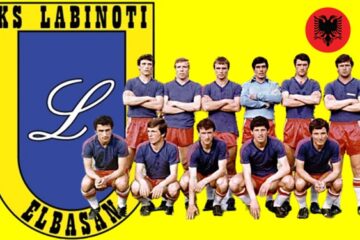Gerd Muller and the story of an impossible love with the Albanian girl!
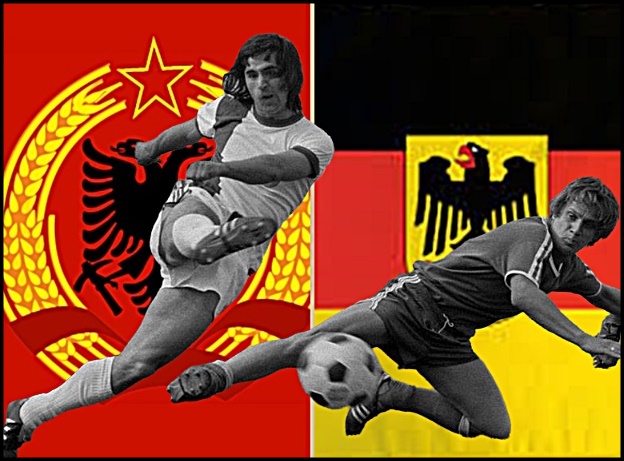
Prologue
It is a mysterious story that appeared on a couple of albanian networks around 2016, 2017, by an albanian freelance journalist, Andi Kasmi. Mr. Kasmi shares with the public a previously unheard, passionate event about the great champion, the world-class goal scorer, Gerd Muller and his impossible love with an Albanian girl named Hojna, which according to him happened in the late 60s. and continued during the 70s.
Totally unique, unheard of before, it seems to have escaped journalists and scrupulous sports historians in Germany an around the world. We don’t know exactly how real and true this story is, but whatever it is, it remains a very interesting one, and at the same time enough to attract the public’s attention. So, it is worth showing it on our website.
Without changing the essence of what the journalist Mr. Kasmi wanted to tell, we will try to examine it according to our point of view, starting from a possible information that we have selected. That`s right, the information available about this event, which is completely missing everywhere in the official world media, with the exception of two or three online Albanian sources.
Anyway, the story goes like this:
I
The historical context and Enver Hoxha’s Albania!
For all generations of readers, not only the young Albanians, we need to go back in time and “experience” the Albania of the 60s-70s.
Although the country was part of the eastern bloc, Albania was the most closed and isolated country compared to the other countries of this bloc. It had severed relations with Yugoslavia in 1948, with the Soviet Union in 1961, and in July 1978 socialist Albania also severed them with China. Enver Hoxhe’s Albania would leave the Warsaw Treaty in 1968 immediately after the aggression that the Soviet Union undertook in Czechoslovakia.
Along with the countries of the west, now also those of the east were considered enemies. Under Enver Hoxha’s system of government, the country lived in a constant state controlled by the dreaded secret police, “SIGURIMI”. Hoxha had taken power in 1944 and created a communist and later socialist system, with the motto “Everything with our strength”.

Albania thus found itself completely isolated, an ideological island in a Europe which, although separated by the Iron Curtain, was slowly evolving. In this climate, any contact with foreigners was viewed with suspicion. Albanian citizens risked severe punishment, including prison, simply for speaking to a “foreigner”. Such was the regime’s paranoia that even owning a radio or Tv that could receive foreign frequencies was considered a crime, an ideological mistake, banned by the Party in power, the PPSH!
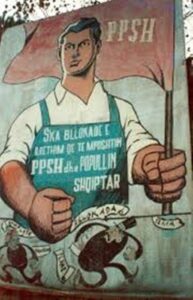
Now, precisely in this contest we have to imagine how was possible that a love story meeting between the famous player Gerd Muller and the Albanian girl, identified as Hojna, one of the employees at the Hotel “Dajti” in Tirana, exactly where the West German representative was accommodated in that distant year of 1967?!
I I
“Dajti” Hotel!
The Dajti Hotel, the scene of this impossible love, has an interesting history of its own. Built in the 1940s and designed by Italian architect Gherardo Bosio, the building was the flagship of Albanian hospitality during the communist era.
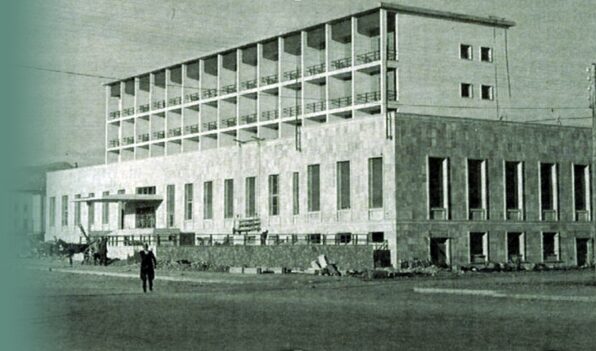
Bosio, who also designed the boulevards and the center of Tirana, created a building that combined elements of Italian rationalist architecture with details inspired by Albanian tradition. The hotel, with its panoramic view of the city and Mount Dajti from which it took its name, was considered the pinnacle of luxury in communist Albania.
It was here that the rare foreign visitors were hosted, mostly diplomats or sports delegations such as that of West Germany. For ordinary Albanians, the Dajti Hotel was a mysterious and inaccessible place, a symbol of the outside world from which they were cut off.
Today, the hotel no longer exists as such. Becoming a cultural monument in 2002, the building is closed to the public and owned by the National Bank of Albania. It remains as a silent witness to a bygone era and a love story that defied borders and ideologies. Its empty rooms, its silent corridors, perhaps still retain the echo of those brief encounters between Gerd and Hojna.
It is easy to imagine the two young people furtively crossing paths in a corridor, exchanging glances full of emotion under the watchful eyes of the hotel staff and, probably, the Sigurimi agents.
* * *
For the German bomber, it was easy to pass every opponent’s defense and send the ball into the net, but in complete contrast to the fearsome “SIGURIMI”, the secret police of communist Albania, where he met the woman who had stolen his heart.
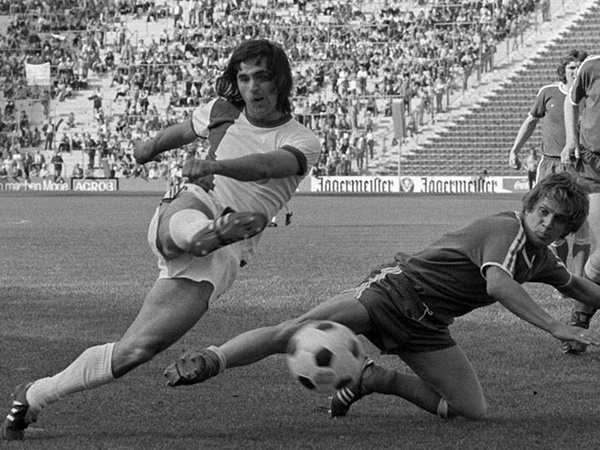
1461 goals; 4 Bundesliga titles and 3 European Cups with Bayern Munich; European Nations Cup and World Cup success with West Germany: big numbers and lofty accolades that earned Gerd Müller the Ballon d’Or in 1970, two European Golden Shoes and the nickname of “Bomber der Nation”. Even now, nearly four decades on since his last Bayern appearance, Müller remains the all-time leading Bundesliga goal scorer.

Such were his goalscoring feats that when the striker was playing his team practically had a goal head start, but one goal Mueller never achieved was sharing his life and love with a little-known Albanian girl. Finding a way through the majority of the defensive line-ups he faced in his time was one thing; however, the daunting ‘Sigurimi’, the communist-era secret police within the small Balkan state where the object of his affections resided, proved far too formidable an obstacle for him.

I I I
It is the winter of 1967. In Tirana, the representative of West Germany has arrived, which, based on a drawing, will play a qualifying match in the framework of the qualifiers of the European Football Championship.
Among those called up was a young 22-year-old striker destined to become a world football legend: Gerd Müller. That day, the future striker did not go on the field, but his heart was apparently elsewhere, in an event that would probably mark his romantic life.
The German delegation stayed at the “Dajti” Hotel, the best that Albania could offer at that time. It was here that fate made Gerd Mueller meet a young Albanian waitress, known only as Hojna. In a place cut off from the outside world, a spark was born that would continue to burn for years. The meeting was short, secret, but intense. Their eyes met in the corridors of the hotel, words whispered in different languages, but with the same language of the heart.
Gerd and Hojna a moment of human nature, in a sea of fear and doubt. For Hojna, even exchanging a few words with Müller was a big risk. For Gerd, accustomed to the freedom of the West, it must have been difficult to fully understand the situation in which the girl found herself.
While his heart was beating for a girl on the other side of the iron curtain, Gerd Müller was becoming one of the most lethal strikers in the history of football. His career was a crescendo of successes and records that led him to be considered one of the greatest goal scorers of all time. With Bayern Munich, Müller won four Bundesliga titles (1969, 1972, 1973, 1974) and three consecutive European Cups (1974, 1975, 1976). His ability to find the back of the net was almost supernatural. Short in stature (only 1.76 m) but gifted with a powerful physique and surprising agility, Müller was capable of scoring in any way: with his head, his foot, acrobatically. His specialty was “dirty” goals, those scored in the six-yard box, often with first touches that surprised defenders. With the German national team, he became European champion in 1972 and World champion in 1974.
It was his goal, in the final against Holland, that gave West Germany the world title. His numbers speak for themselves: 1,461 career goals, 365 goals in the Bundesliga (a record that still stands today), 66 goals in 62 games with the German national team. He won two European Golden Shoes (1970 and 1972) as the top scorer in the European championships, and the prestigious Golden Ball in 1970. It is no coincidence that he earned the nickname “Bomber der Nation” (The Nation’s Bomber). His ability to score was such that it was said that when Müller was on the pitch, his team practically started with a one-goal advantage.
The Match of 1968!
Albania achieved a fine goalless draw at home to the previous year’s World Cup runners-up, a scoreline that was enough to cost West Germany qualification for the finals of Italy 1968 – to date the only European Championship it has missed. 22-year-old Gerd Müller was called-up for the qualifier but oddly did not play and to this day no-one can answer the question as to why Helmut Schön chose not to field the Bayern striker.


As we mentioned before in this article, the country was isolated with any foreign media, artwork or even individual movement strictly forbidden and censored. The people lived in fear of the secret police, a nasty copy of Soviet Russia’s KGB, but with one key difference: in this small country everybody knew everyone else and accusations needed not to be proven: just being accused of betraying the ideology of the communist party PPSH, was enough to ruin the lives of the individual targeted and their entire family; whether deportation, imprisonment or even the death penalty. So it’s easy to understand why the girl concerned wanted to remain anonymous.
Nonetheless, the gossip continued unabated and whispering of the “sparks between the little lovebirds” grew louder and louder among the young folk of Tirana. The West Germany party left the country disappointed with the result, but Müller found it hard to turn his head away from the “Dajti” hotel for a different reason.

I V
The Second Match
Fate would have it that the paths of West Germany and Albania would cross again in 1971, this time in the qualifiers for the 1972 European Championship. The German delegation returned to the Hotel Dajti, and with-it Gerd Müller.
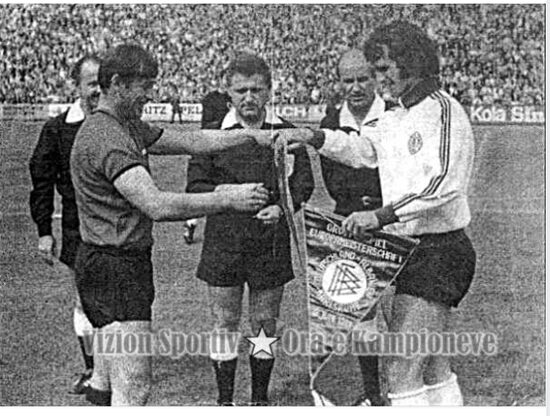
For Müller, it must have been a moment of great emotion and trepidation. Would he see Hojna again? Would she remember him? And above all, how could they communicate under the watchful eyes of the system?
On February 17, 1971, three days after Valentine’s Day, West Germany took to the field at the “Qemal Stafa” stadium in Tirana. This time, Müller not only played, but scored the only goal of the match in the 38th minute, giving his team the victory.

We can only imagine whether Hojna’s presence at the hotel inspired his performance in some way. Perhaps the goal was all about impressing the girl, about showing her who the young German she had met four years earlier really was.
The match took place in a tense atmosphere. The stadium was filled with spectators and at the same time with soldiers and police to prevent any unpleasant situation. But Müller, with his usual coldness, was not impressed. His goal was a classic of his production: a quick touch in the penalty area, anticipating the defenders and the goalkeeper.
After the match, Müller and his friends returned to Hotel Dajti. Was there another brief meeting with Hojna? We can’t know for sure, maybe even the news or rumors don’t report anything, but we can imagine that maybe the two found a way to exchange at least a look, a smile, a sign gratitude in this impossible love.
Despite his success on the pitch, Müller could not shake the thought of Hojna. But circumstances were against them. Albania remained an inaccessible country for tourists, and Müller’s opportunities to return were limited to international matches. For Müller, accustomed to overcoming every obstacle on the football pitch, this situation must have been particularly frustrating. How could a man capable of scoring against the world’s strongest defences be helpless in the face of a political regime? Unfortunately, neither West Germany nor Bayern Munich were drawn to play in Albania again during Müller’s career. The dream of seeing Hojna again seemed destined to remain just that.
Meanwhile, Müller’s life continued with success and glory. He married his long-time girlfriend, Uschi Ebenböck, in 1967, and the couple had a daughter in 1971. But the thought of that Albanian waitress, perhaps a symbol of an impossible love and a life that could have been, never left him.

For Hojna, the situation was even more difficult. Living in a isolate country, she had no way of finding out about Müller or following his career. She could only hope that one day, by some miracle, the German footballer would return to Albania.
V.
Maybe the last chance and the strange contract with HJK Helsinki.
The story could have ended there, but in 1985, four years after Müller retired from professional football, an unexpected opportunity presented itself. Albanian club Flamurtari qualified for the Cup Winners’ Cup and were drawn to face HJK Helsinki in the first round. In a gesture that shows how deep his feelings ran, Müller approached HJK with an extraordinary request: he wanted a one-game contract, just so he could travel to Albania with the team. “I want to see my girlfriend,” Müller reportedly told the Finnish club’s officials.
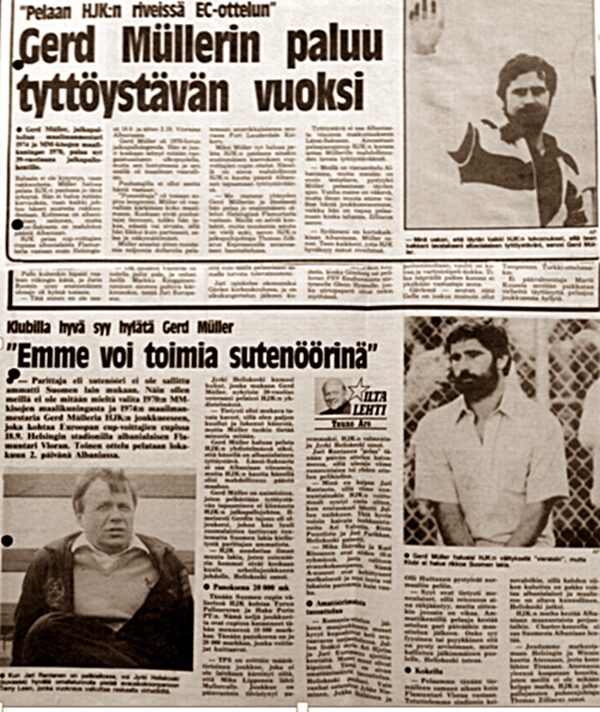
Finnish press comments on Muller’s alleged return
The request put HJK in a difficult position. On the one hand, having a legend like Müller, even at the end of his career, would have been an unprecedented media coup. On the other, there was the fear of provoking a diplomatic incident. Despite the recent death of Enver Hoxha, Albania remained a closed and dangerous country. The HJK leaders must have discussed the issue for a long time. Imagine the meetings, the phone calls, perhaps even the consultations with the Finnish government.
In the end, caution prevailed. HJK declined Müller’s request. The news leaked out and was published in the Finnish newspaper “Italehti”, revealing to the world this romantic and poignant chapter in the life of the great striker.
For Müller, it must have been a huge disappointment. It was his last attempt to see Hojna again, and he had failed. For the first time in his life, perhaps, he was faced with an obstacle that he could not overcome with his skill or determination.
The collapse of the communist era in Albania in 1992 marked the end of an era of isolation and oppression. Borders opened, finally allowing Albanians to connect with the rest of the world. But for Gerd Müller and Hojna, this freedom came too late.
Müller, retired from professional football, had embarked on a new career as a youth coach at Bayern Munich. His life had taken a different direction, far from those memories of his youth in a hotel in Tirana. And yet, those who knew him well sometimes noticed a distant look in his eyes, as if a part of him was still anchored to that distant past.
In 2015, the news of Müller’s Alzheimer’s diagnosis shook the football world. The disease, relentless, began to erode the memories of a legendary career. Perhaps, in some corner of his mind, the image of a young Albanian waitress still persisted, the last bastion against the advance of oblivion.
On August 15, 2021, Gerd Müller passed away at the age of 75, leaving an unfillable void in the world of football. His passing was mourned not only in Germany, but throughout the football world. Fans remembered his extraordinary goals, his humility off the pitch, his dedication to the game. Few, however, knew the story of his meeting with Hojna, a romantic and melancholic chapter of his life that was now definitively closed.
Hojna’s fate remains a mystery. After the fall of the communist system, many Albanians sought their fortune abroad. Others stayed, trying to rebuild their lives in a country that was opening up to the world after decades of isolation. Perhaps Hojna was among them.
Perhaps she followed Müller’s exploits in the newspapers that were finally available, or perhaps the memory of that young German footballer had faded over the years. Who knows if the news of Müller’s death ever reached his ears and what emotions it may have aroused. Between a football epic and a romantic tale, this story highlights the intertwining of great historical events and individual experiences.
The “Bomber der Nation” and the Albanian waitress, separated by an invisible but impenetrable wall, remain symbols of an era in which even the simplest gesture of affection could be an act of rebellion.

V I
Hojna, the mysterious girl
One of the most intriguing aspects of this story is the mystery surrounding Hojna, the girl who worked as a waitress at the “Dajti” Hotel in Tirana in the late 60s! We don’t know if this is her real name or a nickname. The author of this event does not provide us with many details but avoids a lot of facts from which the truth of this girl or even of the event itself can be revealed.
We do not know Hojne’s last name, in order to find out from which family the girl comes and above all, without a first and last name, it cannot be possible to search even in the register of the hotel staff who worked during the late 60s and early the 70s.
What really could have happened to her after the meetings with Müller, always if the event stands up as it could happened and if there really were such meetings between them, Muller and Hojna?!
In an Albania where any contact with foreigners could be severely punished, Hojna must have taken great risks just by talking to Müller. How is it possible for such an event to escape the rigorous supervision of the Security system “SIGURIMI”, in a very isolated country where it was protected in the most scrupulous way from any plot of the external and internal enemy? The author explains that the fear of reprisal together with the conservative mentality of the Albanian society at that time can explain why the identity of this girl has remained hidden until now.
We can only imagine what happened to Hojna after those meetings. Did she continue to work at the Hotel Dajti? Was she discovered and punished for her contacts with Müller? Or did she perhaps manage to keep the secret, carrying the memory of that special meeting with her for years? And what did she think of Müller? Did she know who he really was? Had she understood his fame as a footballer? Or was he simply a charming young foreigner, a glimpse of the world beyond the borders that was closed to her? These questions will probably remain unanswered. The mystery of Hojna adds an element of fascination and melancholy to this story, making it even more touching.
Even if this event as a whole is not true, but made up for a purpose, its author should be congratulated as he has created a very interesting story just like those best seller novels!
By Pjerin Bj
The article was built on the basis of selected information without avoiding the essence of the event, which is authored by the freelance journalist Andi Kasmi.
New York: November 7, 2024
_____________________
Sports Vision + / Champions Hour in activity since 2013
All Photos are courtesy of Google. If you have any issue on our photos, please contact us first, before you are making any report. Thank You!
Discover more from Sports Vision +
Subscribe to get the latest posts sent to your email.


